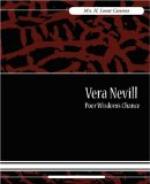Beatrice came out of the drawing-room windows across the lawn to him. She was in her habit, and stood tapping her little boot with her riding whip for some minutes by her father’s side.
“I am going to see uncle Tom, papa,” she said; “have you any message?”
“Going to Lutterton? Ah, that’s right; the ride will do you good, my dear. No; I have no message.”
Beatrice went back into the house; her little bay mare stood at the door. She met her mother in the hall.
“I am going to see uncle Tom,” she said, to her also.
Mrs. Miller always encouraged her children in their attentions to her brother. He was rich, and he was a bachelor; he must have saved a good deal one way or another. Who could tell how it would be left? And then Beatrice was undoubtedly his favourite. She nodded pleasantly to her daughter.
“Tell uncle Tom to come over to lunch on Sunday, and, of course, he must come here early for Guy’s birthday next week,” for there were to be great doings on Guy’s birthday. “Ride slowly, Beatrice, or you will get so hot.”
Lutterton Castle was a good six miles off. The house stood well, and even imposingly, on a high wooded knoll that overlooked the undulating park, and the open valley at its feet. It was a great rambling building with a central tower and four smaller ones at each corner. When Mr. Esterworth was at home, which was almost always, it was his vanity to keep a red flag flying from the centre tower as though he had been royalty. All the reception-rooms and more than half the bedrooms were permanently shuttered up, and there was a portly and very dignified housekeeper, who rattled her keys at her chatelaine, and went through all the unused apartments daily, followed by a meek phalanx of housemaids, to see that all the rooms were well-aired and well kept in order, so that at any minute they might be fit for occupation. Five or six times during the hunting season the large rooms were all thrown open, and there was a hunt breakfast held in the principal dining-hall; but, with that exception, Mr. Esterworth rarely entertained at all.
He occupied three rooms opening out of each other in the small western tower. They consisted of a bedroom, a dressing-room, and a small and rather inconvenient study, where the huntsman, whips, and other official personages connected with the hunt were received at all hours of the day and night. The room was consequently pervaded by a faint odour of stables and tobacco; there were usually three or four dogs upon the hearthrug, and it was a rare thing to find Mr. Esterworth in it unaccompanied by some personage in breeches and gaiters, wearing a blue spotted neckcloth and a horseshoe pin.




